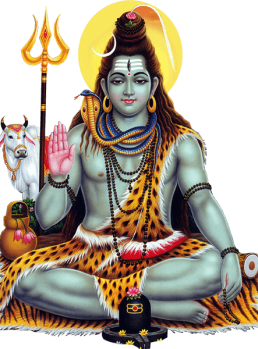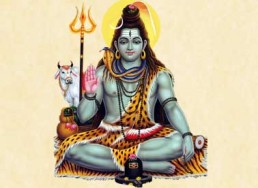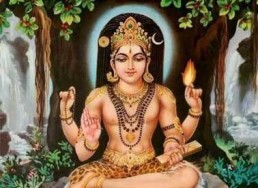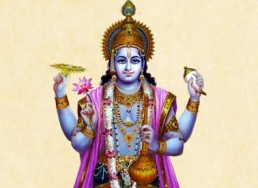Shiva Aparadha Kshamapana Stotram
विण्मूत्रामेध्यमध्ये क्वथयति नितरां जाठरो जातवेदाः ।
यद्यद्वै तत्र दुःखं व्यथयति नितरां शक्यते केन वक्तुं
क्षन्तव्यो मेऽपराधः शिव शिव शिव भो श्रीमहादेव शम्भो ॥ १॥
viṇmūtrāmedhyamadhye kvathayati nitarāṃ jāṭharo jātavedāḥ .
yadyadvai tatra duḥkhaṃ vyathayati nitarāṃ śakyate kena vaktuṃ
kṣantavyo me’parādhaḥ śiva śiva śiva bho śrīmahādeva śambho .. 1..
Through which I passed because of desire for the fruit of my deeds,
Punished me as I lay in my mother’s womb.
There I was boiled in the midst of filthy things:
Who can describe the pain that afflicts the child in its mother’s womb?
Therefore, O Siva! O Mahadeva! O Sambhu! Forgive me, I pray, for my transgressions.
नो शक्तश्चेन्द्रियेभ्यो भवगुणजनिताः जन्तवो मां तुदन्ति ।
नानारोगादिदुःखाद्रुदनपरवशः शङ्करं न स्मरामि
क्षन्तव्यो मेऽपराधः शिव शिव शिव भो श्रीमहादेव शम्भो ॥ २॥
no śaktaścendriyebhyo bhavaguṇajanitāḥ jantavo māṃ tudanti .
nānārogādiduḥkhādrudanaparavaśaḥ śaṅkaraṃ na smarāmi
kṣantavyo me’parādhaḥ śiva śiva śiva bho śrīmahādeva śambho .. 2..
My body was covered with filth and I craved for my mother’s breasts.
Over my body and limbs I had no control;
I was pursued by troublesome flies and mosquitoes;
Day and night I cried with the pain of many an ailment, forgetting thee, O Sankara!
Therefore, O Siva! O Mahadeva! O Sambhu! Forgive me, I pray, for my transgressions.
दष्टो नष्टो विवेकः सुतधनयुवतिस्वादुसौख्ये निषण्णः ।
शैवीचिन्ताविहीनं मम हृदयमहो मानगर्वाधिरूढं
क्षन्तव्यो मेऽपराधः शिव शिव शिव भो श्रीमहादेव शम्भो ॥ ३॥
daṣṭo naṣṭo vivekaḥ sutadhanayuvatisvādusaukhye niṣaṇṇaḥ .
śaivīcintāvihīnaṃ mama hṛdayamaho mānagarvādhirūḍhaṃ
kṣantavyo me’parādhaḥ śiva śiva śiva bho śrīmahādeva śambho .. 3..
Bit into my vitals and slew my discrimination;
I was engrossed in the pleasures of wealth, sons, and a youthful wife.
Alas! My heart, bereft of the thought of Siva,
Was filled with arrogance and pride,
Therefore, O Siva! O Mahadeva! O Sambhu! Forgive me, I pray, for my transgressions.
पापै रोगैर्वियोगैस्त्वनवसितवपुः प्रौढहीनं च दीनम् ।
मिथ्यामोहाभिलाषैर्भ्रमति मम मनो धूर्जटेर्ध्यानशून्यं
क्षन्तव्यो मेऽपराधः शिव शिव शिव भो श्रीमहादेव शम्भो ॥ ४॥
pāpai rogairviyogaistvanavasitavapuḥ prauḍhahīnaṃ ca dīnam .
mithyāmohābhilāṣairbhramati mama mano dhūrjaṭerdhyānaśūnyaṃ
kṣantavyo me’parādhaḥ śiva śiva śiva bho śrīmahādeva śambho .. 4..
My body, though still not wholly bereft of life,
Is weak and senile from many afflictions, from sins and illnesses and bereavements;
But even now my mind, instead of meditating on Siva,
Runs after vain desires and hollow delusions.
Therefore, O Siva! O Mahadeva! O Sambhu! Forgive me, I pray, for my transgressions.
पूजार्थं वा कदाचिद्बहुतरगहनात्खण्डबिल्वीदलानि ।
नानीता पद्ममाला सरसि विकसिता गन्धधूपैः त्वदर्थं
क्षन्तव्यो मेऽपराधः शिव शिव शिव भो श्रीमहादेव शम्भो ॥ ५॥
pūjārthaṃ vā kadācidbahutaragahanātkhaṇḍabilvīdalāni .
nānītā padmamālā sarasi vikasitā gandhadhūpaiḥ tvadarthaṃ
kṣantavyo me’parādhaḥ śiva śiva śiva bho śrīmahādeva śambho .. 5..
Water to bathe thy holy image;
Never, from the deep woods, have I brought the sacred vilwa leaves for thy worship;
Nor have I gathered full-blown lotuses from the lakes,
Nor ever arranged the lights and the incense for worshipping Thee.
Therefore, O Siva! O Mahadeva! O Sambhu! Forgive me, I pray, for my transgressions.
नो लिप्तं चन्दनाद्यैः कनकविरचितैः पूजितं न प्रसूनैः ।
धूपैः कर्पूरदीपैर्विविधरसयुतैर्नैव भक्ष्योपहारैः
क्षन्तव्यो मेऽपराधः शिव शिव शिव भो श्रीमहादेव शम्भो ॥ ६॥
no liptaṃ candanādyaiḥ kanakaviracitaiḥ pūjitaṃ na prasūnaiḥ .
dhūpaiḥ karpūradīpairvividharasayutairnaiva bhakṣyopahāraiḥ
kṣantavyo me’parādhaḥ śiva śiva śiva bho śrīmahādeva śambho .. 6..
I have not decked it with fragrant sandal paste;
I have not worshipped Thee with golden flowers, with incense, with camphor-flame and savoury offerings.
Therefore, O Siva! O Mahadeva! O Sambhu! Forgive me, I pray, for my transgressions.
श्रौते वार्ता कथं मे द्विजकुलविहिते ब्रह्ममार्गानुसारे ।
ज्ञातो धर्मो विचारैः श्रवणमननयोः किं निदिध्यासितव्यं
क्षन्तव्यो मेऽपराधः शिव शिव शिव भो श्रीमहादेव शम्भो ॥ ७॥
śraute vārtā kathaṃ me dvijakulavihite brahmamārgānusāre .
jñāto dharmo vicāraiḥ śravaṇamananayoḥ kiṃ nididhyāsitavyaṃ
kṣantavyo me’parādhaḥ śiva śiva śiva bho śrīmahādeva śambho .. 7..
Unable I am to follow the rules of Veda as told by Brahmins,
Unable I am to know Dharma by listening to Vedas and meditating,
And so what is the use of daily learning all these.
Therefore, O Siva! O Mahadeva! O Sambhu! Forgive me, I pray, for my transgressions.
हव्यं ते लक्षसङ्ख्यैर्हुतवहवदने नार्पितं बीजमन्त्रैः ।
नो तप्तं गाङ्गातीरे व्रतजपनियमैः रुद्रजाप्यैर्न वेदैः
क्षन्तव्यो मेऽपराधः शिव शिव शिव भो श्रीमहादेव शम्भो ॥ ८॥
havyaṃ te lakṣasaṅkhyairhutavahavadane nārpitaṃ bījamantraiḥ .
no taptaṃ gāṅgātīre vratajapaniyamaiḥ rudrajāpyairna vedaiḥ
kṣantavyo me’parādhaḥ śiva śiva śiva bho śrīmahādeva śambho .. 8..
O Mahadeva, thy sacred form;
I have not made in the sacred fire the million oblations of butter,
Repeating the holy mantra given to me by my guru;
Never have I done penance along the Ganges with japa and study of the Vedas.
Therefore, O Siva! O Mahadeva! O Sambhu! Forgive me, I pray, for my transgressions.
नासाग्रे न्यस्तदृष्टिर्विदितभवगुणो नैव दृष्टः कदाचित् ।
उन्मन्याऽवस्थया त्वां विगतकलिमलं शङ्करं न स्मरामि
क्षन्तव्यो मेऽपराधः शिव शिव शिव भो श्रीमहादेव शम्भो ॥ ९॥
nāsāgre nyastadṛṣṭirviditabhavaguṇo naiva dṛṣṭaḥ kadācit .
unmanyā’vasthayā tvāṃ vigatakalimalaṃ śaṅkaraṃ na smarāmi
kṣantavyo me’parādhaḥ śiva śiva śiva bho śrīmahādeva śambho .. 9..
Beyond the three gunas, free from delusion and darkness, absorbed in meditation,
And ever aware of the true nature of the world;
Nor, with a longing heart, have I meditated on Thine auspicious and sin-destroying form.
Therefore, O Siva! O Mahadeva! O Sambhu! Forgive me, I pray, for my transgressions.
शान्ते स्वान्ते प्रलीने प्रकटितविभवे ज्योतिरूपेऽपराख्ये ।
लिङ्गज्ञे ब्रह्मवाक्ये सकलतनुगतं शङ्करं न स्मरामि
क्षन्तव्यो मेऽपराधः शिव शिव शिव भो श्रीमहादेव शम्भो ॥ १०॥
śānte svānte pralīne prakaṭitavibhave jyotirūpe’parākhye .
liṅgajñe brahmavākye sakalatanugataṃ śaṅkaraṃ na smarāmi
kṣantavyo me’parādhaḥ śiva śiva śiva bho śrīmahādeva śambho .. 10..
The prana along the Sushumna, repeating the syllable Om;
Never have I suppressed the turbulent waves of my mind, nor merged the self-effulgent Om
In the ever-shining Witness-Consciousness, whose nature is that of the highest Brahman;
Nor have I, in samadhi, meditated on Sankara, who dwells in every form as the inner guide.
Therefore, O Siva! O Mahadeva! O Sambhu! Forgive me, I pray, for my transgressions.
सत्यं शान्तस्वरूपं सकलमुनिमनःपद्मषण्डैकवेद्यम् ।
जाग्रत्स्वप्ने सुषुप्तौ त्रिगुणविरहितं शङ्करं न स्मरामि
क्षन्तव्यो मेऽपराधः शिव शिव शिव भो श्रीमहादेव शम्भो ॥ ११॥
satyaṃ śāntasvarūpaṃ sakalamunimanaḥpadmaṣaṇḍaikavedyam .
jāgratsvapne suṣuptau triguṇavirahitaṃ śaṅkaraṃ na smarāmi
kṣantavyo me’parādhaḥ śiva śiva śiva bho śrīmahādeva śambho .. 11..
सर्पैर्भूषितकण्ठकर्णविवरे नेत्रोत्थवैश्वानरे ।
युगले दन्तित्वक्कृतसुन्दराम्बरधरे त्रैलोक्यसारे हरे
मोक्षार्थं कुरु चित्तवृत्तिमचलामन्यैस्तु किं कर्मभिः ॥ १२॥
sarpairbhūṣitakaṇṭhakarṇavivare netrotthavaiśvānare .
yugale dantitvakkṛtasundarāmbaradhare trailokyasāre hare
mokṣārthaṃ kuru cittavṛttimacalāmanyaistu kiṃ karmabhiḥ .. 12..
The sole reality underlying the worlds, the giver of good;
Whose head is illumined by the crescent moon and in whose hair the Ganges is hidden;
Whose fire-darting eyes consumed the god of earthly love; whose throat and ears are decked with snakes;
Whose upper garment is a comely elephant-skin.
Of what avail are all the other rituals?
किं वा पुत्रकलत्रमित्रपशुभिर्देहेन गेहेन किम् ।
ज्ञात्वैतत्क्षणभङ्गुरं सपदि रे त्याज्यं मनो दूरतः
स्वात्मार्थं गुरुवाक्यतो भज मन श्रीपार्वतीवल्लभम् ॥ १३॥
kiṃ vā putrakalatramitrapaśubhirdehena gehena kim .
jñātvaitatkṣaṇabhaṅguraṃ sapadi re tyājyaṃ mano dūrataḥ
svātmārthaṃ guruvākyato bhaja mana śrīpārvatīvallabham .. 13..
Of what avail the body or a house?
Know all these to be but momentary and quickly shun them;
Worship Siva, as your guru instructs you, for the attaining of Self-Knowledge.
माठापत्यं ह्यनृतवचनं साक्षिवादः परान्नम् ।
ब्रह्मद्वेषः खलजनरतिः प्राणिनां निर्दयत्वं
मा भूदेवं मम पशुपते जन्मजन्मान्तरेषु ॥ १४॥
māṭhāpatyaṃ hyanṛtavacanaṃ sākṣivādaḥ parānnam .
brahmadveṣaḥ khalajanaratiḥ prāṇināṃ nirdayatvaṃ
mā bhūdevaṃ mama paśupate janmajanmāntareṣu .. 14..
प्रत्यायान्ति गताः पुनर्न दिवसाः कालो जगद्भक्षकः ।
लक्ष्मीस्तोयतरङ्गभङ्गचपला विद्युच्चलं जीवितं
तस्मात्त्वां शरणागतं शरणद त्वं रक्ष रक्षाधुना ॥ १५॥
pratyāyānti gatāḥ punarna divasāḥ kālo jagadbhakṣakaḥ .
lakṣmīstoyataraṅgabhaṅgacapalā vidyuccalaṃ jīvitaṃ
tasmāttvāṃ śaraṇāgataṃ śaraṇada tvaṃ rakṣa rakṣādhunā .. 15..
His youth wears away; the day that is gone never returns.
Almighty time devours everything;
Fickle as lightning is the goddess of fortune.
O Siva! O Giver of shelter to those that come to Thee for refuge!
Protect me, who have taken refuge at thy feet.
वन्दे पन्नगभूषणं मृगधरं वन्दे पशूनां पतिम् ।
वन्दे सूर्यशशाङ्कवह्निनयनं वन्दे मुकुन्दप्रियं
वन्दे भक्तजनाश्रयं च वरदं वन्दे शिवं शङ्करम् ॥१६॥
vande pannagabhūṣaṇaṃ mṛgadharaṃ vande paśūnāṃ patim .
vande sūryaśaśāṅkavahninayanaṃ vande mukundapriyaṃ
vande bhaktajanāśrayaṃ ca varadaṃ vande śivaṃ śaṅkaram ..16..
I salute the cause of the Universe
I salute the lord of beasts, adorned with snakes;
I salute Siva, whose three eyes shine like the sun, the moon, and fire;
I salute the beloved of Krishna; I salute Sankara, who bestows boons on His devotees and gives them shelter;
I salute the auspicious Siva.
खट्वाङ्गं च सितं सितश्च वृषभः कर्णे सिते कुण्डले ।
गङ्गा फेनसिता जटा पशुपतेश्चन्द्रः सितो मूर्धनि
सोऽयं सर्वसितो ददातु विभवं पापक्षयं सर्वदा ॥ १७॥
khaṭvāṅgaṃ ca sitaṃ sitaśca vṛṣabhaḥ karṇe site kuṇḍale .
gaṅgā phenasitā jaṭā paśupateścandraḥ sito mūrdhani
so’yaṃ sarvasito dadātu vibhavaṃ pāpakṣayaṃ sarvadā .. 17..
White is the skull thou holdest in thy hand; white is thy club, which threatens the wicked!
White is the bull on which thou ridest; white are the rings that hang from thine ears!
White appear thy matted locks, covered with the foam of the Ganges;
White shines the moon on thy forehead!
May He who is all white, all pure, bestow on me the treasure of forgiveness for my transgressions!
श्रवणनयनजं वा मानसं वाऽपराधम् ।
विहितमविहितं वा सर्वमेतत्क्ष्मस्व
शिव शिव करुणाब्धे श्रीमहादेव शम्भो ॥ १८॥
śravaṇanayanajaṃ vā mānasaṃ vā’parādham .
vihitamavihitaṃ vā sarvametatkṣmasva
śiva śiva karuṇābdhe śrīmahādeva śambho .. 18..

Shiva Aparadha Kshamapana Stotram
The Shiva Aparadha Kshamapana Stotram, or “Hymn of Forgiveness for Offenses to Lord Shiva,” is a heartfelt composition by the revered philosopher and saint Sri Adi Sankaracharya. This powerful hymn expresses a devotee’s deep humility and earnest repentance for past mistakes and transgressions. Addressed to Lord Shiva, the stotram serves as a prayer for forgiveness, reflecting the seeker’s longing to overcome ignorance, impurities, and human frailties.
In this stotram, Shankaracharya acknowledges the impermanence of human life and the inevitable shortcomings that come with it. Each verse appeals to Lord Shiva as the ever-compassionate and benevolent deity who understands human fallibility and guides devotees toward liberation. The hymn emphasizes that while external rituals and rites may have their place, the true essence of devotion lies in inner purity, humility, and surrender to Shiva’s supreme grace. For practitioners and devotees, chanting this hymn is a profound reminder of the merciful nature of Shiva and a means to seek his guidance, protection, and ultimate forgiveness.
Other Shiva Shlokams
Aksharamalika Shiva Stotram
Also called the Shiva Akshara Mala Stotram, this is a very popular prayer addressed to Lord Shiva. Each verse starts in the order of alphabets in Sanskrit.
Anayasena Maranam
O Lord Shiva, please grant me a peaceful death without pain (Anasayena Maranam), a life without any trouble or dependence on others for my basic needs (Vina Dhainyena Jeevanam) and a life filled with
Ardha Narishvara Stotram
Shri Ardhanareeshwara Stotram was composed by Sri Adi Shankara bhagavatpada. Creator and Creation are One ~ Ardhanarishwara, composite of Shiva and Shakti together in one body.
Bhoothanath Ashtakam
The Bhoothanatha Ashtakam composed by Shri Krishnadasa is a devotional hymn that glorifies Lord Shiva in his form as Bhoothanatha, the Lord of all beings, spirits, and the cosmos.
Bilvashtakam
Composed by Sri Adi Shankaracharya, the famous Bilvashtakam extols the virtues of the Bilva leaf (also spelt Vilva, Bilwa) and Lord Shiva’s love for it. The following com
Bilvashtakam 14 Verses
Note: For the original version of Bilvashtakam please click here. Composed by Sri Adi Shankaracharya,
Chandrashekhara Ashtakam
Chandrashekhara Ashtakam is a divine hymn to praise God Shiva as Chandrasekhara, the lord who is adorned with moon on his head (Chandra – moon, Sekhar – crown) and to seek refuge from untimely death.
Dakshinamurthy Stotram
Shlokams,Sankara,Shiva,Dakshinamurthy
The Dakshinamurti Stotra is a Sanskrit religious hymn to Shiva by Sri Adi Shankaracharya. It explains the metaphysics of the universe in the frame of the tradition of Advaita V
Ishvaro Guru Atmeti
Shlokams,Shiva,Dakshinamurthy,Guru,Sankara
Salutations to Lord Dakshinamurti, who is all-pervasive like space but who appears (as though) divided as Lord, Guru, and the Self.
Kalabhairava Ashtakam
Composed by Sri Adi Shankaracharya. The hymn illustrates the personality of Kala Bhairava of Kashi, the God of Death(kala). Those who study these 8 verses on Kala Bhairava, which are enticing and whic
Karacharana Kritam
O Lord, kindly forgive all the wrong acts and omissions I have committed, whether I committed them knowingly or unknowingly, with my hands, feet, words, ears, eyes, or mind. Glory to you, Mahadeva, wh
Karpura Gauram
Pure white like camphor, an incarnation of compassion, the essence of worldly existence, whose garland is the king of serpents, always dwelling inside the lotus of the heart. I bow to Shiva and Shakti together
Kasi Viswanathashtakam
Composed by Sri Adi Sankaracharya in praise of Lord Shiva. That man who reads this octet with its meaning, which sings the praise of Shiva who is the lord of Varanasi, would get knowledge, wealth, gre
Lingashtakam
The Lingashtakam is one of the most popular Ashtakams(a Stotram with 8 verses) dedicated to Lord Shiva which praises Him in the abstract "Lingam" form.
Maha Shivaratri
Significance of Ganesh Puja, Vinayaka Chavithi or Chathurthi. See how to prepare for Ganesha Pooja, How to perform the Puja with Video instructions and enjoy Audio devotional songs, uninterrupted and without ads.
Mantra Pushpam
The Mantra Pushpam (literally translating to "Flower of Mantras") is a collection of sacred verses from the 10th chapter of Taittiriya Aranyaka of Krishna Yajur Veda. Each verse begins with an exploration of the relationship between the flower of…
Margabandhu Stotram
This great Stotra Rathna was written by Appayya Deekshitha(1520-1593). He was one of the great interpreter of Advaitha Sidhantha after Adi Sankara. This stotra is written in praise of the Lord Margaba
Mauna Vyakhya
Shlokams,Sankara,Shiva,Dakshinamurthy
I salute Sri Dakshinamurti, who is not subject to time, who makes known the truth of Brahman through the implied meaning of words, who is surrounded by disciples who are themselves Rishis and committe
Mruthyunjayaya Rudraya
Salutation to you Mrithyunjaya, Rudra, Nilakanta, Shambhu & the lord of immortals and this great lord of all beings.
Namaste astu bhagavan
Morning prayer. From Devi Mahatmyam. The Devi Mahatmyam is a Hindu religious text describing the Goddess as the supreme power and creator of the universe. It is part of the Markandeya Purana, and esti
Nidhaye Sarvavidyanam
Shlokams,Sankara,Shiva,Dakshinamurthy
Salutations to Sri Dakshinamurti, the reservoir of knowledge (the abode of all learning), the healer of all those who suffer from the disease of samsāra, and the teacher of the whole world.
Om Namah Pranavarthaya
Shlokams,Sankara,Shiva,Dakshinamurthy
Om. Salutation to the one who is the meaning of praņava, who is in the form of pure knowledge, who is taintless and who is free from any change. To that Sri Dakshinamurti, (my) salutations.
Om Namo Bhagavate Dakshinamurthaye
Shlokams,Sankara,Shiva,Dakshinamurthy
Om. Salutations to Bhagavan Dakshinamurti. (Oh Lord) Bless me with memory, the capacity to think properly, and clarity, wisdom.
Rudra Ashtakam
The famous Rudrashtakam extols the many qualities of Shiva. This is composed by Sri Goswami Tulsidas. Rudra is considered as the fearsome manifestation of Shiva. Rudrashtakam has its origins in the Ra
Rudram Chamakam
The Chamakam portion of the Sri Rudram is a profound and structured Vedic prayer that follows the Namakam, extending the worship of Lord Rudra (Shiva) by asking for blessings and the fulfillment of various needs. Unlike the Namakam, which focuses on…
Rudram Chamakam Meaning
The Chamakam portion of the Sri Rudram is a profound and structured Vedic prayer that follows the Namakam, extending the worship of Lord Rudra (Shiva) by asking for blessings and the fulfillment of various needs. Unlike the Namakam, which focuses on…
Rudram Laghunyasam
Laghunyasam is a preliminary Vedic chant traditionally recited before performing the Sri Rudram to purify and align the body, mind, and spirit with divine energy. The term "Nyasam" refers to a process of mentally assigning or dedicating various…
Rudram Laghunyasam Meaning
Laghunyasam is a preliminary Vedic chant traditionally recited before performing the Sri Rudram to purify and align the body, mind, and spirit with divine energy. The term "Nyasam" refers to a process of mentally assigning or dedicating various…
Rudram Namakam
The Namakam portion of the Sri Rudram, also known as the Rudra Prashna, is a profound and intricate Vedic hymn found in the Krishna Yajurveda, specifically within the Taittiriya Samhita (Book 4, Chapter 5). The term Namakam is derived from the…
Rudram Namakam Meaning
The Chamakam portion of the Sri Rudram is a profound and structured Vedic prayer that follows the Namakam, extending the worship of Lord Rudra (Shiva) by asking for blessings and the fulfillment of various needs. Unlike the Namakam, which focuses on…
Shambu Devam Sakalajagatam
I sing in praise of God Shambhu, the Lord of all worlds, and the three-eyed one; the consort of Gauri, the grantor of happiness, blessings and gifts, the one with the moon as his crest-jewel.
Shambu Stuti
A stuti on lord Shiva composed by lord Rama himself. Lord Rama recites this at Rameshwaram when faced with the near impossibility of crossing the vast ocean to reach Lanka, he prayed intensly to Lord
Shiva Ashtakam
Composed by Adi Shankaracharya. This ashtakam is a descriptive salutation of the different attributes of Shiva. The great yogi who is referred to as Ardhanarishwara (the one who has included the femin
Shiva Mahimna Stotram
The Shiva Mahimna Stotra is very popular among the devotees of Lord Shiva and is considered one of the best among all Stotras (or Stutis) offered to Lord Shiva. The legend abou
Shiva Mahimna Stotram Meaning
The Shiva Mahimna Stotra is very popular among the devotees of Lord Shiva and is considered one of the best among all Stotras (or Stutis) offered to Lord Shiva. The legend abou
Shiva Manasa Puja
Sri Adi Shankaracharya composed this mantra for lord Shiva. Using this stotra, we can perform mental worship of Lord Shiva.
Shiva Panchakshara Stotram
The famous Shiva Panchakshara Stotram praises Shiva and the power of the five sacred syllables, na-ma-shi-va-ya.
Shiva Pratah Smaranam
This is a short and beautiful 'Three Shloka Prayer' that makes the start of the day full of energy and happiness. Composed by Sri Adi Shankaracharya.
Shiva Sahasranama Stotram
Also called the Shiva Akshara Mala Stotram, this is a very popular prayer addressed to Lord Shiva. Each verse starts in the order of alphabets in Sanskrit.
Shiva Shadakshara Stotram
In this Hexa-Syllabic Hymn, there is a single stanza mantra for each letter of Aum-Na-Ma-Shi-Va-Ya. This mantra is found in Rudrayamala Tantra text.
Shiva Tandava Stotram
Shiva Tandava Stotram The Shiva Tandava Stotram is a deeply powerful and rhythmic hymn that glorifies Lord Shiva's cosmic dance, known as the Tāṇḍava. It is traditiona
Tatpurushaya Vidmahe Rudra Gayatri Mantra
Om. May we know that Lord Isvara, for which may we meditate upon Mahadeva. May that Rudra impel us (towards him).
Tryambakam Yajamahe
We worship Lord Shiva the three-eyed one, the one who is the master of all senses and qualities and the one who is the sustainer of all growth. May he release us from the bondage of death, just as a r
Vagarthaviva Sampruktau
Kalidasa prays to the divine parents Paarvathi & Parameshwara who are inseparable like the word and its meaning, in order to guide him in acquiring the power of words and their meanings (literature) as he embarks on the Mahakavya, Raghuvamsa.
Vande Shambu Umapatim
I salute Shambu, Umapati, the preceptor (teacher) of devas, I salute the cause of the earth, I salute the one ornamented with the serpent, the wearer of the moon, I respect that master of all beings.
Vedasara Shiva Stava
Composed by Sri Adi Shankaracharya in praise of Lord Shiva - the essence of vedas.
Shiva Aparadha Kshamapana Stotram – Shiva – In Sanskrit, English Translation, Meaning, Significance and Audio.



